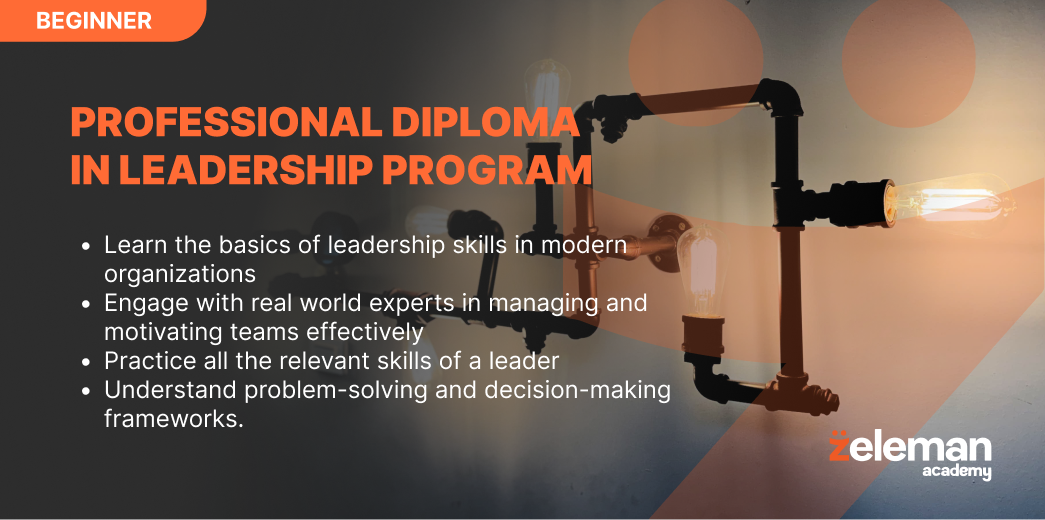Introduction to Leadership

#Leadership & Management
In Partnership With

About the Course
Introduction
The Beginner Level of the Professional Diploma in Leadership equips learners with the essential foundations of leadership practice. It focuses on emotional intelligence, communication, motivation, ethics, and organizational awareness. Learners will gain a strong understanding of how to lead themselves and others while applying leadership concepts in both Ethiopian and global contexts.
Trainee Qualification Requirements and Prerequisites
● No prior leadership or management experience required.
● Basic communication skills recommended.
● Openness to teamwork, reflection, and cultural perspectives.
Training Delivery
● Interactive lectures, workshops, and group discussions.
● Role-plays, case studies, and peer feedback.
● Use of AI tools and digital collaboration platforms.
Training Level
Beginner – 3 months (8 components).
Training Objectives
● Understand the foundations and importance of leadership in modern organizations.
● Develop emotional intelligence and self-leadership skills.
● Build strong communication, listening, and influencing skills.
● Learn to manage and motivate teams effectively.
● Apply problem-solving and decision-making frameworks.
● Recognize and practice ethical responsibility in leadership roles.
Training Subject Areas
The Beginner Level introduces learners to the essentials of leadership, focusing on self-development, interpersonal communication, and building the foundation for managing teams.
- Foundations of Leadership in the Modern Era: Provides an overview of leadership concepts, the differences between leadership and management, and the evolution of leadership across history. Learners explore leadership styles and their relevance in Ethiopian and global workplaces.
- Emotional Intelligence & Self-Leadership: Focuses on the role of self-awareness, self-regulation, empathy, and motivation in leadership. Learners will explore strategies to develop resilience, authenticity, and confidence while managing personal stress and growth.
- Communication, Listening & Influence: Equips learners with techniques for effective communication, active listening, persuasion, and influence. Emphasis is placed on clarity, non-verbal communication, and cultural contexts in Ethiopia.
- Motivation, Teamwork & Collaboration: Covers motivational theories and their application to leadership. Learners practice how to inspire others, build trust, manage conflict, and foster collaboration for team success.
- Decision-Making & Problem-Solving: Introduces structured frameworks for making sound decisions and solving problems creatively. Learners develop critical thinking skills and practice applying them to leadership challenges.
- Ethics & Leadership Responsibility: Examines the moral and ethical dimensions of leadership, including integrity, fairness, accountability, and transparency. Learners analyze dilemmas and practice responsible decision-making.
- Organizational Behavior & Culture: Explores how organizational structures and cultures shape leadership effectiveness. Learners study Ethiopian and international case studies on workplace culture and employee engagement.
- Leadership & Social Responsibility: Highlights the responsibility of leaders to contribute positively to society. Learners will examine corporate social responsibility, sustainability, and community-focused leadership practices.
Assessment and Evaluation
● Quizzes, case study reflections, and group presentations.
● Peer and instructor feedback on communication and teamwork activities.
● Final beginner-level leadership project.
Reference Resources
● Primal Leadership by Daniel Goleman.
● Harvard Business Review leadership case studies.
● Ethiopian leadership and organizational behavior texts.
Who should learn this course?
- Aspiring leaders and professionals seeking to understand essential leadership concepts and practices.
- Employees looking to improve their emotional intelligence, communication, and teamwork abilities.
- Those interested in building self-leadership capacity and managing others effectively within Ethiopian and global contexts.
- Individuals open to collaborative learning, reflection, and ethical leadership principles.
What you will learn?
- To understand the foundations and importance of leadership in modern organizations.
- To develop emotional intelligence and self-leadership skills critical for personal and professional growth.
- To build strong communication, listening, and influencing skills for effective interpersonal interactions.
- To learn how to manage and motivate teams towards collaboration and success.
- To apply structured problem-solving and decision-making frameworks in leadership scenarios.
- To recognize and practice ethical responsibility and accountability in leadership roles.
What is required to learn this course?
- Basic communication skills recommended.
- No prior leadership or management experience required.
- Openness to teamwork, reflection, and cultural perspectives.
